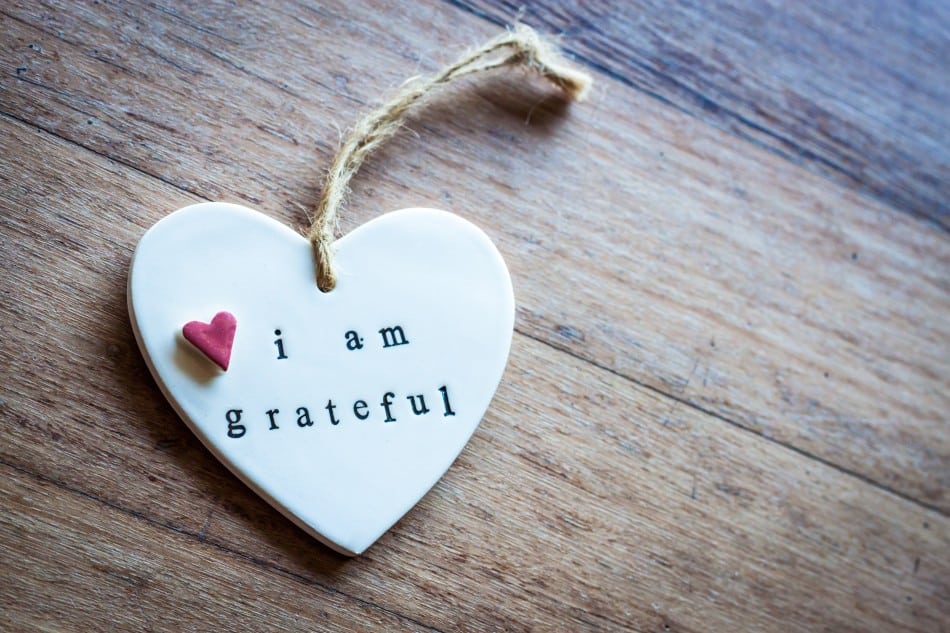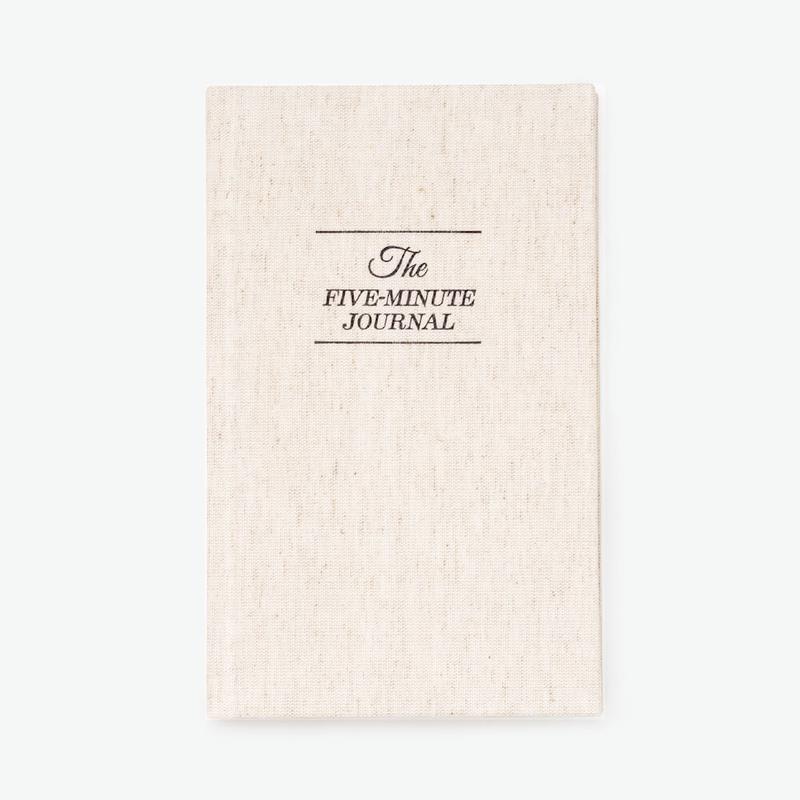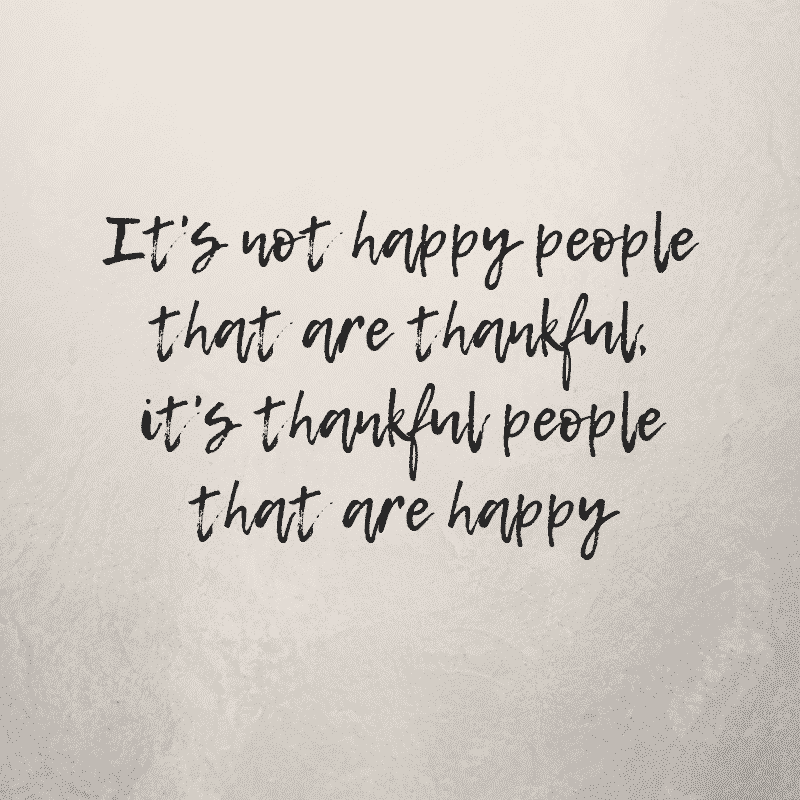How to Practice Gratitude
Quick Navigation
This post may contain affiliate links. Read the full disclosure here
Gratitude is a powerful feeling. The more of your life you can spend feeling grateful, the better.
Although, being grateful doesn’t occur naturally (for most).
Negative thoughts are sticky while positive thoughts, compliments, and successes seem to pass straight through our minds.
While it doesn’t come naturally, there are simple approaches that can bring more gratitude into your life. Adding simple gratitude practices to your routine can banish these automatic-negative-thoughts, leading to a happier and healthier you.
Did you know that practicing gratitude will actually rewire your brain??
Learning how to practice gratitude is easier than you think, we’ll show you how.
What is Gratitude?
In the simplest terms, gratitude is the expression of appreciation and thankfulness. It is focusing on all the good that is in your life.
Gratitude is the opposite of envy, judgment, and jealousy. It’s tied to joy, confidence, love, happiness, and contentment. It’s all the things that we strive for in life…
Quick Story on Gratitude
The following story illustrates the power of gratitude.
A mother has twins that couldn’t be more opposite of each other. One twin is an optimist. He is always happy with an incredibly positive outlook on life. No matter what happens, he always seems to view things in a positive light. The other twin has an extremely negative, pessimistic view on life. He finds faults and issues with everything associated with his life.
The mother decides to do a little experiment on their next birthday, just to see what will happen. She gets the pessimist every popular toy possible. She gets him games, robots, action figures, dinosaurs, and more. His room is packed with all the best toys to choose from. Instead for the optimist, the mother gets him a huge lump of horse manure.
Later that day she walks by the rooms to see how the boys are doing. She first visits the pessimist’s room and sees him whining and crying on the floor. “What’s wrong?” she asks. “Oh, I have soo many toys that need batteries, it’s too hard to keep up. Now everyone at school is going to want to play with my new toys and they will be jealous. All these toys are going to break anyway,” he responds.
Next, the mother walks by the optimist’s room to find him singing and swimming through the huge lump of manure. Confused, the mother asks “What in the world are you doing?” With glee, he responds “Look at all this manure, there has got to be a pony in here somewhere!”
While the story is extreme, there is an underlying lesson. Things aren’t positive or negative, it is your perception that makes is so. Hear this story and others on Kwik Brain’s gratitude podcast episode, it’s worth a listen.
We all have wonderful things in our lives that we take for granted and do not fully appreciate. Taking the time to be grateful for what you do have can dramatically improve your life. It is all too easy to get caught up in the comparison game, wishing you had the life of another.
How to Practice Gratitude
Getting into a grateful state takes practice, but as you build your gratitude muscle, it will get easier over time. It may feel unnatural at first. Most of us have been programmed to focus on the negative. We compare ourselves to others and focus on the gaps where we come out as the loser. The good news is that getting started with a daily gratitude practice is easy!

List 3 Things You are Grateful For
Start with a very simple task. Grab a pen and paper and jot down three things you are grateful for. That’s it. Don’t do this on your phone or computer. Grab a physical piece of paper and write.
Physically writing requires you to place greater focus on the task at hand, which creates stronger connections to different parts of your brain.
This is an incredibly simple task, but yet, it is still difficult for many of us. How many negative thoughts first came to mind before you reached a positive one? If there was even one, you have some work to do. Don’t worry, these automatic negative thoughts can be changed with practice.
If you are having a tough time listing three things you are grateful for, start small. Here are some examples that could apply to you:
- I am grateful to be able to see the world, I can read this amazing article with my own two eyes
- I am grateful to have access to food and running water
- I am grateful to have a roof over my head
- I am grateful for this delicious cup of coffee
- I am grateful for my last meal
If these don’t apply to you, that’s okay, find three that do. There are simple things that you get to enjoy, that perhaps you take for granted. Life is a gift, this exercise helps you recognize that.
Once you finish, do it again tomorrow… and then the day after that. Start or end your day with this gratitude exercise. Our brains love repetition and it takes time to make grateful thoughts a habit. On future lists, some items can be the same as the previous day, but even better if you can find new things to be grateful for.
Want to really feel grateful? Focus your list only to things that money can’t buy. It’s important to focus on all the good in your life, outside of material objects.
As you start to getting into-the-groove creating your gratitude list, pay attention to how you feel. Perhaps some of the weight is lifted off your shoulders (even if only for a short period). This is the feeling we’re tapping into. The more we can trigger it, the more it naturally it will occur in your daily routine.

The Five Minute Journal
Complain less, appreciate more, and increase happiness with just five minutes a day.
Show Your Appreciation
Start the day sharing the appreciation you have for a coworker, a loved one, or friend. If you are happy someone is in your life, tell them. Not only will this make their day, it will make yours too. Expressing appreciation to others is a great way to strengthen relationships and feel good along the way.
If you are impressed with the work that a coworker did, tell them! These positive thoughts don’t do others any good if we keep them to ourselves.

Gratitude Benefits
Gratitude can be used to reduce depression, improve physical health, and increase happiness. When you are truly grateful, you can’t be angry, unhappy, or anxious. It is an emotion that completely takes over your body and mind, which is why it can be helpful for those struggling with mental health issues.
Gratitude Reduces Anxiety
When the mind is stuck in the anxious gear, it often involves replaying thoughts and experiences that we’re not proud of. Anxiety is tied to self-doubt, depression, low confidence, and lower self-worth. Gratitude is a method of training your brain to reduce these negative thoughts.
One study found that those who participated in gratitude exercises lowered death anxiety. It is believed that positive thoughts around previous life experiences reduced the ultimate fear of dying because the gratitude participants had the perception of a life well-lived.
Makes us Happier
Gratitude can improve happiness and improve overall well-being. Studies have shown those who did gratitude exercises had increased happiness scores and reported a higher quality of life. Gratitude can also have a lasting impact, though it is the most powerful with ongoing practice.
Gratitude for Physical Health
According to a 2012 study published in Personality and Individual Differences, those who practiced gratitude had fewer aches and pains and reported feeling healthier. Grateful people have also been shown to take better care of themselves through exercise and regular checkups which can lead to longevity.
Improves Sleep
Writing in a gratitude journal can improve sleep and reduce worry. It has been found that simple gratitude exercises can help those get deeper, longer sleep, and decrease a racing mind before bed. Sleep is a critical component for brain health.
Boosts Self-Esteem
Practicing gratitude can improve self-esteem and reduce social comparisons. Replace feelings of jealousy and envy with self-love, confidence, and support for others. Rather than comparing yourself to others’ highlight reels, gratitude helps you focus on all you have to offer the world.
Reduces Stress
The impacts of gratitude for reducing stress have been known for many years. One study published in Behavior Research and Therapy found that war veterans with higher levels of gratitude were less likely to experience PTSD (post-traumatic stress disorder).

Looking to Take Your Gratitude to the Next Level?
Start your daily practice with the Five Minute Journal. It uses a simple, structured format (based on research) to help you start and end your day with gratitude.

